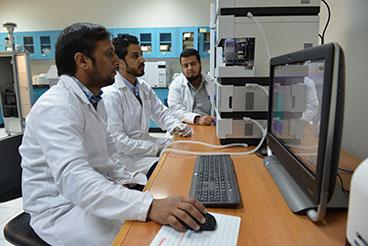
Overview
Environmental Engineering Department
The department of environmental engineering is considered as a pioneer since it is the first department to offer the bachelor’s degree environmental engineering in the Kingdom of Saudi Arabia. It concentrates on application of fundamentals of sciences and engineering towards improvement of the environment (air, water, and earth resources) for provision of potable and palatable water, clean air, and useful land to be used by human and other living organisms and for treatment of polluted areas. Environmental engineering incorporates water and air quality management, abatement of pollution, reuse and recycling, hazardous solid waste disposal, general health issues and knowledge of related law to environmental engineering. Environmental engineering also involves environmental impact assessment for proposed projects in building and industry. An environmental engineer is concerned with environmental behavior and hazardous solid waste management in the form of studies to evaluate these hazards, offering advice regarding treatment and enclosure, and establishing systems to prevent accidents. Other concerns of the environmental engineer are design of municipal and industrial water supply, wastewater treatment systems. This is in addition to the responsibilities all over the globe with environmental issues such as: effects of trans boundary pollutants, ozone layer depletion, water pollution, air pollution from vehicles and industrial sources.
Vision
Create a distinguished program promoting excellence in environmental engineering education and research with effective community services.
Mission
Graduate distinguished engineers capable of developing sustainable solutions to environmental challenges, incorporating R&D and community services.
Program Educational Objectives
The Environmental Engineering Program with its various constituents discussed in successive meetings the ABET requirements for the development of the Program Educational Objectives (PEOs) by focusing on the main elements of the university’s mission such as: creative knowledge, research, and professional community services. All those elements are the key focus points of PEOs of the program and those PEOs can help us to envision the future of our prospective and current students. After several departmental meetings, the department with the help of its constituents including students, faculty, alumni, potential employers, and the advisory committee approved the following PEOs.
The approved PEOs for our program are to:
1. Pursue careers in environmental engineering or other fields and seek professional licensure.
2. Seek advanced degrees or continue to engage in life-long learning to adapt to evolving technologies and changing career opportunities.
3. Attain leadership roles to be an advocate for their profession for the broader good of the community.
Student Outcomes
The SO along with program criteria constitutes a predetermined set of competencies that students should demonstrate at the time of graduation. These competencies are accomplished through various courses taken by the students during the course of the program. However, performance measures would have to be specified for all SO to make them measurable and relevant to the Environmental Engineering program. Before graduation, students of the Imam Abdulrahman bin Faisal University’s Environmental Engineering program will demonstrate:
- an ability to identify, formulate, and solve complex engineering problems by applying principles of engineering, science, and mathematics.
- an ability to apply engineering design to produce solutions that meet specified needs with consideration of public health, safety, and welfare, as well as global, cultural, social, environmental, and economic factors.
- an ability to communicate effectively with a range of audiences.
- an ability to recognize ethical and professional responsibilities in engineering situations and make informed judgments, which must consider the impact of engineering solutions in global, economic, environmental, and societal contexts.
- an ability to function effectively on a team whose members together provide leadership, create a collaborative and inclusive environment, establish goals, plan tasks, and meet objectives.
- an ability to develop and conduct appropriate experimentation, analyze, and interpret data, and use engineering judgment to draw conclusions.
- an ability to acquire and apply new knowledge as needed, using appropriate learning strategies.
Prof. Omer AGA
Head of Department
Phone: +966-(03)-3331698
Fax: +966-(03)-8572872
Email: ce.eed@iau.edu.sa
External Advisory Board
The External Advisory Board serves a crucial function in accomplishing the objectives of the Environmental Engineering Department. The External Advisory Committee meets at the end of each academic year. Members of the external advisory committee provide advice and suggestions on emerging trends, necessary skills, employability, program review, curriculum development, graduates, innovation, and research, as well as compliance of department’s strategic plan with the Kingdom's future vision.
Members of the External Advisory Board
- Prof. Dr. Jean-Claude Bonzongo (Expert)
Department of Environmental Engineering Sciences, University of Florida, USA.
- Dr. Nawaf Blaisi, Associate Professor (Governmental Representative)
Director of Environmental Protection and Control, National Center for Waste Management, Saudi Arabia.
- Muhammad Al-Rayyan (Employer)
Groundwater Protection Engineer, Saudi Aramco, Saudi Arabia.
- Ali Abdullah Al-Marhoon (Post-graduate)
M.Sc. Student, Environmental Engineering Department, IAU.
- Abdulaziz Al-Barjas (Alumni)
Director of Garden Maintenance and Landscape Architecture, Hail Municipality, Saudi Arabia.

